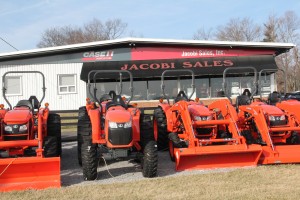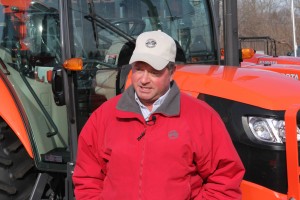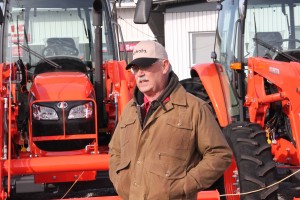Taxing issue . . . Farmers frustrated over equipment deduction flap
Posted on Mar 1, 2015
One of the most popular provisions in the federal tax code keeps getting snagged in Congressional wrangling over broader tax policies. That’s not sitting well with the farmers and small business operators who benefit from Section 179, which allows a deduction on the purchase of equipment.

KFB Director Scott Travis of Spencer County offers a case in point about the situation. Last year he hedged on the purchase of a $65,000 grain bin because he wasn’t sure of the tax deduction that would be allowed under Section 179. The maximum limit had fallen to $25,000 from $500,000 for 2014, but then was reset to $500,000 in mid-December as part of a package of tax breaks that cleared Congress.
“We went pretty much the whole year not knowing” the rate, Travis said. “I have to make my bottom line work, and that’s hard to do when you’re unsure” about the rules.
The uncertainly lives on. For 2015, the limit is back to $25,000 and will remain so unless Congress acts. American Farm Bureau Federation is leading the charge for a bill making the $500,000 threshold permanent.
Without being a negotiating point in wheeling and dealing, a permanent law should be no problem, says KFB National Affairs Director L. Joe Cain.
“If Section 179 was a stand-alone bill, it would have no problem passing either chamber,” he said. “This is a very popular law that has worked as intended.”
Section 179 allows small businesses (those with less than 250 employees) to deduct from gross income the full purchase price of qualifying equipment and/or software. The code includes caps on the deduction and the total amount of the equipment purchased.
The law was enacted as an incentive to encourage businesses to invest in themselves. The Congressional Budget Office consistently has scored Section 179 as a success in stimulating business growth.
Travis offered an explanation as to why.
“When I bought a grain bin, a trucker hauled it to my farm, a concrete contractor poured the base and another business installed an auger. That’s three other businesses that benefitted from the purchase, and we all pay taxes and contribute to other jobs,” Travis said.

Shelby County farmer Shane Courtney, who has significantly expanded his operation in recent years, says Section 179 “gives farmers an opportunity to mitigate their tax liability.”
“In any type of long-term planning, you’re looking at building infrastructure and adding equipment,” said Courtney. “179 is an incentive for business growth.”
All small businesses that purchased, financed or leased less than $2 million in new or used business equipment during tax year 2014 should quality for the Section 179 deduction. Past the $2 million mark the deduction decreases on a dollar-to-dollar scale, making 179 a deduction specifically for small and medium-sized businesses.
For obvious reasons, the Association of Equipment Manufacturers also is pushing for a permanent law at the $500,000 level. Shelby County FB President John Wills happens to be service manager at Jacobi Sales in Shelbyville. He says the 179 situation is unfair to all.

“Farmers are businessmen – they don’t make rash decisions on major purchases,” he said. “And no way can we (Jacobi Sales) make plans while Congress drags this out. Last fall, when this (the bill for 2014) was in the works, I told our sales people to be ready, but nothing was certain.”
The 2014 legislation (HR5771) brought a quick spike in equipment sales in late December as farmers raced to act before the deduction limit went back down. As for now, the normally brisk late winter-early spring sales season has arrived with farmers unsure about how they could truly benefit tax-wise from a purchase.
Farmers Scott Travis and Shane Courtney say the situation is senseless.
“We need this type of expensing in order to provide food security” for the nation, Travis said.
Added Courtney: “We are in a very volatile industry; continuity (in the tax policy) would help.”
Tagged Post Topics Include: Congressional Budget Office, Deductions, Equipment, Farming, Jacobi Sales, Joe Cain, John Wills, National Affairs, Scott Travis, Section 179, Shane Courtney, Shelby County, Spencer County, Tax code
Comments